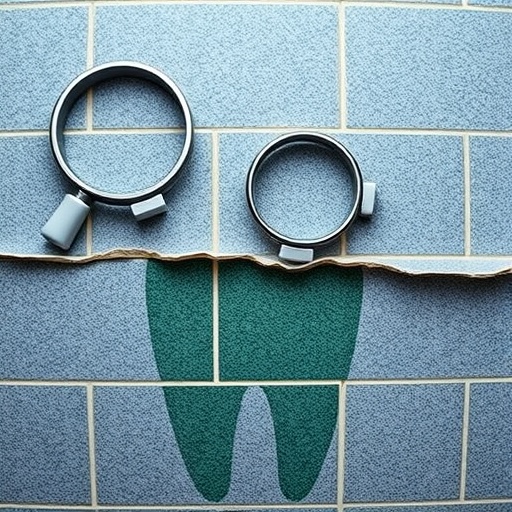The impact of eating disorders on health extends far beyond the realm of psychological distress and body image issues; it tangentially affects various aspects of physical health as well. A recent study has brought to light the specific dental care needs of individuals battling these disorders, illustrating a critical yet often overlooked element in the recovery journey. This groundbreaking research, authored by Gidlund, Hasselblad, and Larsson-Gran, sheds light on the intersection of mental health and dental care, emphasizing the multifaceted challenges faced by this vulnerable population.
Eating disorders, including anorexia nervosa, bulimia nervosa, and binge eating disorder, often lead to numerous health complications, including severe deficiencies in vital nutrients. These disorders can manifest physically in ways that profoundly impact dental health. For instance, individuals who engage in purging behavior often experience significant dental erosion due to the acidic nature of vomit. This has detrimental effects on the enamel, leading not only to aesthetic issues but also to increased sensitivity and a heightened risk of cavities.
Additionally, eating disorders can precipitate systemic health concerns that indirectly affect oral health. Malnutrition, which commonly accompanies these conditions, results in a weakened immune system. This diminishes the body’s ability to ward off infections, including those that can affect the gums and oral cavity. Consequently, individuals with eating disorders may experience a higher prevalence of periodontal disease, further complicating their dental health status.
The researchers sought to uncover the extent to which these individuals face unmet dental care needs throughout their recovery process. Utilizing a qualitative methodology, they gathered data from various subjects who have either experienced eating disorders or are currently in recovery. Through in-depth interviews and surveys, patterns emerged that underscore the significant barriers these individuals encounter when seeking dental care.
Among the primary obstacles identified is the stigma associated with eating disorders. Many individuals feel ashamed or embarrassed to seek help, fearing judgment from health professionals. This stigma can lead to delayed or avoided dental visits, which exacerbate existing dental issues. The psychological toll of the disorder can also deter individuals from addressing their dental health needs, as they may prioritize their eating disorder symptoms over other health concerns.
Financial barriers also play a crucial role in limiting access to necessary dental care. The costs associated with dental treatments can be exorbitant, especially for individuals who may already be facing financial constraints due to their disorder. This creates a vicious cycle where the lack of accessible care inhibits recovery, thereby perpetuating the need for further dental assistance in the long run.
Moreover, the study highlights the crucial need for healthcare providers to adopt a more holistic approach in treating individuals with eating disorders. Dental care professionals must receive training to understand the complexities surrounding these disorders. By fostering an empathetic and informed environment, dentists can better support the unique needs of patients with eating disorders, ranging from dietary discussions to strategies for managing dental erosion.
Data collected through the study indicates a pressing need for integrated care models that address both mental health issues and physical health outcomes, including oral health. Collaboration between dental professionals, psychologists, and nutritionists can facilitate comprehensive treatment plans that empower individuals on their path to recovery. This integration is vital not only for improving immediate dental health but also for enhancing overall well-being.
In addition to improving access and incorporation of dental care into treatment regimens, the study calls for an increased awareness of the unique dental challenges faced by individuals with a history of eating disorders. Educational campaigns aimed at both the public and healthcare professionals could significantly improve outcomes by encouraging early intervention and destigmatizing the need for dental care among this population.
The findings of this research provide clearer insights into the critical connection between dental health and eating disorders. More specifically, they underscore the importance of breaking down the barriers that lead to unmet dental care needs. Realizing that oral health is a fundamental aspect of recovery can prompt a shift in how healthcare systems prioritize services for these individuals.
As the dialogue around the relationship between mental health and physical health continues to evolve, the insights gained from this study have the potential to influence policy changes within the healthcare system. By emphasizing the need for comprehensive care, including mental health support and dental health access, we can enhance the overall treatment experience for individuals battling these challenging disorders.
In conclusion, as society becomes increasingly aware of the complexities underlying eating disorders, it is essential that we extend our understanding to encompass the essential role of dental health in recovery. The journey to recovery involves addressing not only the psychological dimensions of eating disorders but also the physiological repercussions that manifest in various forms, including oral health challenges. The research conducted by Gidlund and colleagues is not just a call for improved dental care but an urgent reminder that recovery should be all-encompassing, addressing the interconnected nature of mental and physical health.
The urgency of addressing unmet dental care needs in individuals with eating disorders cannot be overstated. As we move forward, it’s imperative that we prioritize education, access, and empathy in healthcare settings to ensure that all individuals receive the holistic support they need to recover fully. With greater awareness and decisive action, we can pave the way for a healthier future for those affected by eating disorders.
Subject of Research: Unmet dental care needs in individuals with eating disorders.
Article Title: The journey to recovery: unmet dental care needs in individuals with eating disorders.
Article References:
Gidlund, U., Hasselblad, T., Larsson-Gran, P. et al. The journey to recovery: unmet dental care needs in individuals with eating disorders.
J Eat Disord 13, 188 (2025). https://doi.org/10.1186/s40337-025-01376-x
Image Credits: AI Generated
DOI: 10.1186/s40337-025-01376-x
Keywords: Eating disorders, dental health, recovery, unmet needs, healthcare integration.




